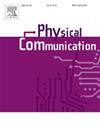Uplink power control for cell-free massive MIMO URLLC systems over aging and spatially correlated channels
IF 2
4区 计算机科学
Q3 ENGINEERING, ELECTRICAL & ELECTRONIC
引用次数: 0
Abstract
This paper investigates the impact of channel aging on the performance of cell-free (CF) massive multiple-input multiple-output (MIMO) systems for ultra-reliable low-latency communication (URLLC), considering spatial correlation and pilot contamination. Closed-form expressions are derived for the uplink achievable rate under finite block length (FBL) and maximum ratio combining (MRC). To maximize the weighted sum rate for all users, a maximum power optimization problem is formulated. The original non-convex problem is transformed into a series of geometric programming (GP) problems using successive convex optimization (SCO) and logarithmic methods, which are solved iteratively. The numerical results verify the correctness of our derived closed expression for the achievable rate under the FBL. Channel aging significantly degrades the performance of CF massive MIMO URLLC systems. Moreover, the proposed maximum power allocation strategy improves the 95%-likely per-user uplink spectral efficiency (SE) compared to systems without power control, effectively mitigating the adverse effects of channel aging.
无小区大规模MIMO URLLC系统在老化和空间相关信道上的上行功率控制
本文研究了信道老化对无单元(CF)大规模多输入多输出(MIMO)系统超可靠低延迟通信(URLLC)性能的影响,同时考虑了空间相关性和导频污染。推导了有限块长(FBL)和最大比值组合(MRC)条件下上行可达速率的封闭表达式。为了使所有用户的加权和率最大化,提出了最大功率优化问题。利用连续凸优化和对数方法将原非凸问题转化为一系列几何规划问题,并进行迭代求解。数值结果验证了所导出的可达速率封闭表达式的正确性。信道老化严重降低了CF大规模MIMO URLLC系统的性能。此外,与没有功率控制的系统相比,所提出的最大功率分配策略提高了95%的可能的每用户上行链路频谱效率(SE),有效地缓解了信道老化的不利影响。
本文章由计算机程序翻译,如有差异,请以英文原文为准。
求助全文
约1分钟内获得全文
求助全文
来源期刊

Physical Communication
ENGINEERING, ELECTRICAL & ELECTRONICTELECO-TELECOMMUNICATIONS
CiteScore
5.00
自引率
9.10%
发文量
212
审稿时长
55 days
期刊介绍:
PHYCOM: Physical Communication is an international and archival journal providing complete coverage of all topics of interest to those involved in all aspects of physical layer communications. Theoretical research contributions presenting new techniques, concepts or analyses, applied contributions reporting on experiences and experiments, and tutorials are published.
Topics of interest include but are not limited to:
Physical layer issues of Wireless Local Area Networks, WiMAX, Wireless Mesh Networks, Sensor and Ad Hoc Networks, PCS Systems; Radio access protocols and algorithms for the physical layer; Spread Spectrum Communications; Channel Modeling; Detection and Estimation; Modulation and Coding; Multiplexing and Carrier Techniques; Broadband Wireless Communications; Wireless Personal Communications; Multi-user Detection; Signal Separation and Interference rejection: Multimedia Communications over Wireless; DSP Applications to Wireless Systems; Experimental and Prototype Results; Multiple Access Techniques; Space-time Processing; Synchronization Techniques; Error Control Techniques; Cryptography; Software Radios; Tracking; Resource Allocation and Inference Management; Multi-rate and Multi-carrier Communications; Cross layer Design and Optimization; Propagation and Channel Characterization; OFDM Systems; MIMO Systems; Ultra-Wideband Communications; Cognitive Radio System Architectures; Platforms and Hardware Implementations for the Support of Cognitive, Radio Systems; Cognitive Radio Resource Management and Dynamic Spectrum Sharing.
 求助内容:
求助内容: 应助结果提醒方式:
应助结果提醒方式:


